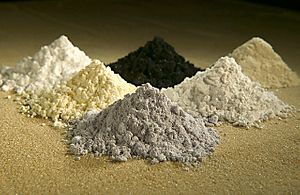A U.K.-based private equity firm has found the largest rare earth oxides deposits in the world in North Korea, according to statements by the company.
The British firm, SRE Minerals Limited, announced the results of its assessment of North Korea’s deposits last month. Most notably, the company said that it estimates that the Jongju deposit holds 216 million tons of rare earth oxides, which includes light rare earth elements (REEs), heavy REEs, and rare earth minerals. According to Voice of America, this would more than double the current global stockpiles of rare earth oxides, which the U.S. Geographical Survey recently estimated at 110 million tons.
Rare earth elements are used in many sophisticated technologies from cell phones to guided missiles. Although they are not especially rare, China controls upwards of 90 percent of the market due to its more lax regulations than Western countries in mining REEs. At times China has shown an inclination to use its near monopoly on REEs to exert leverage over other countries in political disputes.
It has long been known that North Korea sits on top of significant REE reserves, among other minerals, however SRE Minerals’ estimate is significantly higher than previously thought. Theoretically, the discovery could break China’s stranglehold on the REE market, as North Korea would have over six times the amount of REEs as does Beijing. Moreover, environmental regulations and labor conditions would not be a factor in mining them in North Korea, as they are in many developed countries.
That being said, significant obstacles remain that should temper expectations. The challenge now will be in mining the REEs and then shipping them to foreign markets. Besides any technical challenges involved in this process, the political environment in North Korea is exceedingly difficult to work in, and this has inhibited Pyongyang’s ability to exploit its significant mineral wealth for decades.
In announcing the estimate last month, SRE Minerals also revealed that it had formed a joint venture with state-owned Korea Natural Resources Trading Corporation to bring the REEs to market. The joint venture, which is being called the Pacific Century Rare Earth Mineral Limited, will be based out of the British Virgin Islands, likely in an effort on SRE Minerals’ part to avoid sanctions.
Pacific Century has been given a 25 year contract to develop the Jongju deposit, and reportedly intends to build a processing plant on site. However, the North Korean regime has a long history of abruptly cancelling long-term contracts with foreign companies, sometimes merely on a whim but also because of changes in the political relations between Pyongyang and the company’s home country.
During the Sunshine Policy of the 1990s, for example, many South Korean mineral companies invested heavily in North Korea, only to lose their investments when tensions between the two Koreas returned. Equally troubling for SRE Minerals, at times North Korea has encouraged foreign companies to make huge initial human and capital investments in the country, only to kick out the companies after these investments had been made. This is what happened to the Xiyang Group, a huge Chinese mining conglomerate, who invested $40 million in building a mine and training North Koreans only to be ordered to leave the country once domestic workers could handle the work independently.

































